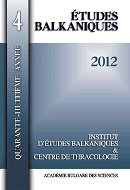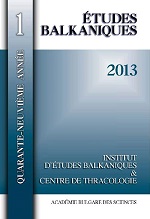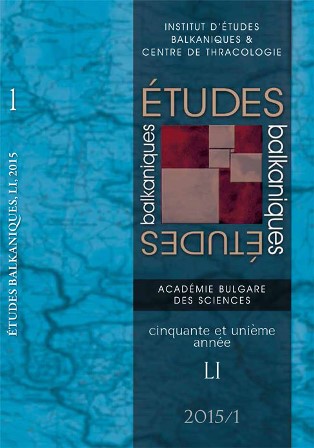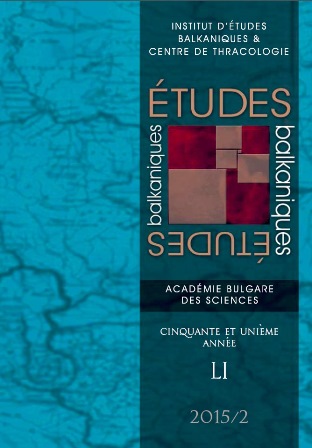













Keywords: Bulgarian-Greek academic cooperation; Balkan Studies; bilateral relations
The article offers an evaluation of the half century of Bulgarian-Greek bilateral scholarly cooperation in the field of Balkan studies. The beginning of this exchange is related to the establishment of the Association internationale des études sud-est européennes (AIESEE), founded in 1963, which encouraged the emergence and development of research centers in the region, the Institute of Balkan Studies at the Bulgarian Academy of Sciences being one of them. The article traces the joint academic events of the Institute with various Greek research and educational institutions such as the Institute for Balkan Studies (IMXA) in Thessaloniki, KNE (Center of Modern Greek Studies), the Universities of Athens, Florina, Komotini and Ioaninna as well as the Institute of Mediterranean Studies in Rethymno (Crete). Attention is also paid to the joint forums, the collections of studies with participation of academics from the two countries and the wide spectrum of themes that engage the two parties. The article also shows how these established academic practices have often turned into a good base for the cultural and diplomatic relations between the two states.
More...
Keywords: Foreign Sources for Balkan History; 15th – 18th c.; Narratives; Italian Historiography
“Sources of the Bulgari Chronicle” is the first attempt all written sourcesof an anonymous chronicle to be revealed. This chronicle has come down to us intwo manuscripts in Italian (one of them is entitled “Un manoscritto (18° secolo)che riguarda la storia dei conti Bulgari”) found in the archive of Bulgari family ofCorfu. It was published bilingually (in Italian and in Greek) in 2010 in Greece byStefanos Konstantinos Voulgaris, a descendant of the Bulgari family. The Chroniclehas evoked great interest in Bulgaria because this is the first comprehensive presentationof the Bulgarian medieval history in a separate book that has reached ourtimes. The revealing of the Bulgari Chronicle’s sources is an important task becauseit will provide information about the nationality of its unknown author, about hisancestry, about the time of the Chronicle’s composition. All authors and titles referredto in the Chronicle are presented in tables, which indicate that there are twomain sources of information. They are the works of the Jesuits Louis Maimbourgand Antonio Foresti, due to which the history of the Bulgarian medieval rulers, representedas forefathers of the Bulgari family of Corfu, has been compiled. As a resultof the analysis done, it is concluded that the author of the Bulgari Chronicle was anItalian, a devoted Catholic, who followed the principles of the historical writing inthe time of the Counter-Reformation. As to the time of the Chronicle’s composition,the possible terminus post quem is 1693, determined by the chronological order ofthe printing of the volumes of Antonio Foresti’s “Mappamondo Istorico”; the terminusante quem is 1698, when the Venetian Senate issued a decree conferring Antonio Bulgari and his successors the title of count.
More...
Keywords: Manuscript; Short Chronicle; Ottoman Balkan Possessions; Ottoman Expansion; Balkan History
The National Museum of Sarajevo, Bosnia and Herzegovina, holds Lyturgion (Missal) No E 543 from the beginning of the 16th c. which was probably written in the St. Joachim of Osogovo (Sarandapor) Monastery near Kriva Palanka, in today’s Republic of Macedonia. It contains the short Sarandapor Chronicle which follows the world history from the Creation to 1512. The laconic notes mention some important moments of the Ottoman expansion and the subsequent period. The identity of the persons and the events included in the chronicle offer valuable historical information. The Sarandapor Chronicle is a copy of a Serbian work, but the history described in it is not just Serbian – it is pan-Balkan. The monks who compiled the text perceived the persons and events included in it as part of a common history.
More...
Keywords: Cross-Cultural History; Allogenous Elites Nettoworks; XVIIth – XVIIIth Century; Transylvania;Romanian Principalities;
Using as a vantage point the case study of a Levantine family of diplomats of Genovese descent, Mamucca della Torre, the research follows up the intricate trails of physical mobility and sociological ambiguity of a number of transimperial subjects from Italy, which took early roots in the Genovese colonies of the Levant and in the Balkans (Istria). Subjects of the Ottoman Porte, diplomats in the service of Western powers, they settled eventually in Constantinople, Bucharest, Iași, Miklosvar and Kronnstadt (Transilvania), Viennna and Trieste. For three generations, members of the Mamucca della Torre family crossed back and forth the borders of the Ottoman and Habsburg empires, trading loyalties and privileges according to their own interests and assuming multiple functions specific to pre-modern societies: diplomats, interpreters, civil servants, military commanders. Based mainly on their secret diplomatic correspondence and on their private letters, the inquiry looked for answers to the issue of the status of the transimperial subjects against the overall process of reshuffling the ethnic, linguistic, cultural, religious, social and collective identities in Eastern Europe in the 17th and 18th centuries. The reconstruction of such dynamic and heterogeneous networks of cultural exchange and transfer by the means of cross-cultural history has found in individual biographies (Marc’Antonio Mamucca della Torre and his daughter countess Maria) or in family portraits (Mamucca della Torre, Kálnoky, Ferrati, Neniul) a valuable pool of customs and practices in-between the public and the private, or the East and the West.
More...
Keywords: Tridentine Reforms; Ottoman Balkans; Bosnian Franciscans
The post-Tridentine period was a time of reorganization and renovation of the Catholic Church and these processes provoked reforms in the Catholic ecclesiastic structures in the Ottoman Balkans as well. A significant factor for the penetration of the renovation ideas among the local Catholics was the Franciscan Province Bosna Argentina. But the implementation of the Tridentine reforms caused some disturbances of the traditional Franciscans’ work and resulted in many controversies. Nevertheless, the post-Tridentine reform program, contributed to the revitalization of the Catholic activities in the territories under the Ottomans.
More...
Keywords: Modernization processes; Balkans;
An important contribution to the study of modernization processes in the Balkans.
More...
Keywords: Economic history; Balkans;
A very precious and useful handbook for economic and monetary historians of the Balkans.
More...
Keywords: Bulgarian tsar Samuil; Conference
Thousand years from the death of the great Bulgarian tsar Samuil (997-1014) conference report.
More...